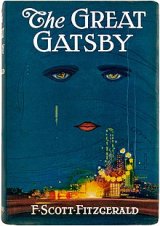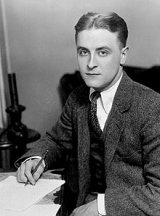The Great Gatsby Page #27
The Great Gatsby is a 1925 novel by American writer F. Scott Fitzgerald. Set in the Jazz Age on Long Island, near New York City, the novel depicts first-person narrator Nick Carraway's interactions with mysterious millionaire Jay Gatsby and Gatsby's obsession to reunite with his former lover, Daisy Buchanan. The novel was inspired by a youthful romance Fitzgerald had with socialite Ginevra King, and the riotous parties he attended on Long Island's North Shore in 1922
West.” “Your wife does,” exclaimed Tom, startled. “She’s been talking about it for ten years.” He rested for a moment against the pump, shading his eyes. “And now she’s going whether she wants to or not. I’m going to get her away.” The coupé flashed by us with a flurry of dust and the flash of a waving hand. “What do I owe you?” demanded Tom harshly. “I just got wised up to something funny the last two days,” remarked Wilson. “That’s why I want to get away. That’s why I been bothering you about the car.” “What do I owe you?” “Dollar twenty.” The relentless beating heat was beginning to confuse me and I had a bad moment there before I realized that so far his suspicions hadn’t alighted on Tom. He had discovered that Myrtle had some sort of life apart from him in another world, and the shock had made him physically sick. I stared at him and then at Tom, who had made a parallel discovery less than an hour before—and it occurred to me that there was no difference between men, in intelligence or race, so profound as the difference between the sick and the well. Wilson was so sick that he looked guilty, unforgivably guilty—as if he had just got some poor girl with child. “I’ll let you have that car,” said Tom. “I’ll send it over tomorrow afternoon.” That locality was always vaguely disquieting, even in the broad glare of afternoon, and now I turned my head as though I had been warned of something behind. Over the ash-heaps the giant eyes of Doctor T. J. Eckleburg kept their vigil, but I perceived, after a moment, that other eyes were regarding us with peculiar intensity from less than twenty feet away. In one of the windows over the garage the curtains had been moved aside a little, and Myrtle Wilson was peering down at the car. So engrossed was she that she had no consciousness of being observed, and one emotion after another crept into her face like objects into a slowly developing picture. Her expression was curiously familiar—it was an expression I had often seen on women’s faces, but on Myrtle Wilson’s face it seemed purposeless and inexplicable until I realized that her eyes, wide with jealous terror, were fixed not on Tom, but on Jordan Baker, whom she took to be his wife. ------------------------------------------------------------------------ There is no confusion like the confusion of a simple mind, and as we drove away Tom was feeling the hot whips of panic. His wife and his mistress, until an hour ago secure and inviolate, were slipping precipitately from his control. Instinct made him step on the accelerator with the double purpose of overtaking Daisy and leaving Wilson behind, and we sped along toward Astoria at fifty miles an hour, until, among the spidery girders of the elevated, we came in sight of the easygoing blue coupé. “Those big movies around Fiftieth Street are cool,” suggested Jordan. “I love New York on summer afternoons when everyone’s away. There’s something very sensuous about it—overripe, as if all sorts of funny fruits were going to fall into your hands.” The word “sensuous” had the effect of further disquieting Tom, but before he could invent a protest the coupé came to a stop, and Daisy signalled us to draw up alongside. “Where are we going?” she cried. “How about the movies?” “It’s so hot,” she complained. “You go. We’ll ride around and meet you after.” With an effort her wit rose faintly. “We’ll meet you on some corner. I’ll be the man smoking two cigarettes.” “We can’t argue about it here,” Tom said impatiently, as a truck gave out a cursing whistle behind us. “You follow me to the south side of Central Park, in front of the Plaza.” Several times he turned his head and looked back for their car, and if the traffic delayed them he slowed up until they came into sight. I think he was afraid they would dart down a side-street and out of his life forever. But they didn’t. And we all took the less explicable step of engaging the parlour of a suite in the Plaza Hotel. The prolonged and tumultuous argument that ended by herding us into that room eludes me, though I have a sharp physical memory that, in the course of it, my underwear kept climbing like a damp snake around my legs and intermittent beads of sweat raced cool across my back. The notion originated with Daisy’s suggestion that we hire five bathrooms and take cold baths, and then assumed more tangible form as “a place to have a mint julep.” Each of us said over and over that it was a “crazy idea”—we all talked at once to a baffled clerk and thought, or pretended to think, that we were being very funny … The room was large and stifling, and, though it was already four o’clock, opening the windows admitted only a gust of hot shrubbery from the Park. Daisy went to the mirror and stood with her back to us, fixing her hair. “It’s a swell suite,” whispered Jordan respectfully, and everyone laughed. “Open another window,” commanded Daisy, without turning around. “There aren’t any more.” “Well, we’d better telephone for an axe—” “The thing to do is to forget about the heat,” said Tom impatiently. “You make it ten times worse by crabbing about it.” He unrolled the bottle of whisky from the towel and put it on the table. “Why not let her alone, old sport?” remarked Gatsby. “You’re the one that wanted to come to town.” There was a moment of silence. The telephone book slipped from its nail and splashed to the floor, whereupon Jordan whispered, “Excuse me”—but this time no one laughed. “I’ll pick it up,” I offered. “I’ve got it.” Gatsby examined the parted string, muttered “Hum!” in an interested way, and tossed the book on a chair. “That’s a great expression of yours, isn’t it?” said Tom sharply. “What is?” “All this ‘old sport’ business. Where’d you pick that up?” “Now see here, Tom,” said Daisy, turning around from the mirror, “if you’re going to make personal remarks I won’t stay here a minute. Call up and order some ice for the mint julep.” As Tom took up the receiver the compressed heat exploded into sound and we were listening to the portentous chords of Mendelssohn’s Wedding March from the ballroom below. “Imagine marrying anybody in this heat!” cried Jordan dismally. “Still—I was married in the middle of June,” Daisy remembered. “Louisville in June! Somebody fainted. Who was it fainted, Tom?” “Biloxi,” he answered shortly. “A man named Biloxi. ‘Blocks’ Biloxi, and he made boxes—that’s a fact—and he was from Biloxi, Tennessee.” “They carried him into my house,” appended Jordan, “because we lived just two doors from the church. And he stayed three weeks, until Daddy told him he had to get out. The day after he left Daddy died.” After a moment she added. “There wasn’t any connection.” “I used to know a Bill Biloxi from Memphis,” I remarked. “That was his cousin. I knew his whole family history before he left. He gave me an aluminium putter that I use today.” The music had died down as the ceremony began and now a long cheer
Translation
Translate and read this book in other languages:
Select another language:
- - Select -
- 简体中文 (Chinese - Simplified)
- 繁體中文 (Chinese - Traditional)
- Español (Spanish)
- Esperanto (Esperanto)
- 日本語 (Japanese)
- Português (Portuguese)
- Deutsch (German)
- العربية (Arabic)
- Français (French)
- Русский (Russian)
- ಕನ್ನಡ (Kannada)
- 한국어 (Korean)
- עברית (Hebrew)
- Gaeilge (Irish)
- Українська (Ukrainian)
- اردو (Urdu)
- Magyar (Hungarian)
- मानक हिन्दी (Hindi)
- Indonesia (Indonesian)
- Italiano (Italian)
- தமிழ் (Tamil)
- Türkçe (Turkish)
- తెలుగు (Telugu)
- ภาษาไทย (Thai)
- Tiếng Việt (Vietnamese)
- Čeština (Czech)
- Polski (Polish)
- Bahasa Indonesia (Indonesian)
- Românește (Romanian)
- Nederlands (Dutch)
- Ελληνικά (Greek)
- Latinum (Latin)
- Svenska (Swedish)
- Dansk (Danish)
- Suomi (Finnish)
- فارسی (Persian)
- ייִדיש (Yiddish)
- հայերեն (Armenian)
- Norsk (Norwegian)
- English (English)
Citation
Use the citation below to add this book to your bibliography:
Style:MLAChicagoAPA
"The Great Gatsby Books." Literature.com. STANDS4 LLC, 2025. Web. 26 Feb. 2025. <https://www.literature.com/book/the_great_gatsby_1598>.








Discuss this The Great Gatsby book with the community:
Report Comment
We're doing our best to make sure our content is useful, accurate and safe.
If by any chance you spot an inappropriate comment while navigating through our website please use this form to let us know, and we'll take care of it shortly.
Attachment
You need to be logged in to favorite.
Log In